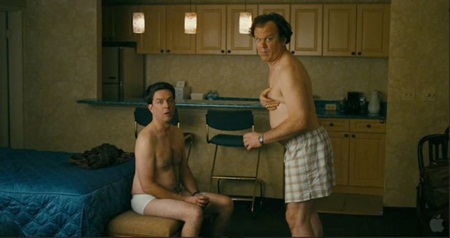 Whenever Hollywood ventures outside the city and explores that realm known as middle America/the Heartland/fly-over country, the tendency is to portray the region as an alien landscape and the denizens to be a quirky race which needs to be addressed with either scorn or mockery. Rarer is the time when these folks are portrayed as substantive and worthy of attention. The entire success of a film like Cedar Rapids is how well you accept the manner it both skewers and elevates the characters. The film is based on melding and mixing the usual ridicule with endearing components, fusing those elements with humor in a small story about small people.
Whenever Hollywood ventures outside the city and explores that realm known as middle America/the Heartland/fly-over country, the tendency is to portray the region as an alien landscape and the denizens to be a quirky race which needs to be addressed with either scorn or mockery. Rarer is the time when these folks are portrayed as substantive and worthy of attention. The entire success of a film like Cedar Rapids is how well you accept the manner it both skewers and elevates the characters. The film is based on melding and mixing the usual ridicule with endearing components, fusing those elements with humor in a small story about small people.
The film centers on the life of Tim Lippe, an anonymous insurance salesman in his 30s from a miniscule municipality outside Milwaukee. Tim is an inexperienced adult with undeveloped emotional, and life, experience. While recalling Steve Carrell’s 40 Year-Old Virgin Tim is not all wide-eyed innocence and not entirely without flaws. We meet him as he is involved in a physical relationship with a savvy cougar for a lover (Sigourney Weaver), and then we learn that she is his former middle school teacher. While she is sowing the wild oats of the newly-divorced Tim is blind to the shallowness of the affair, and attempts to give her a promise ring, declaring them to be “pre”-engaged.
We grasp that Lippe is in fact is more of an arrested development case, evidenced by his boss explaining to him his thoughts when he began working in their office at the age of sixteen. “I thought ‘This is a kid who might be going somewhere.’ And then you just didn’t.” Tim is idealistic about their profession, and the high-flyer salesman in their office (the cheekily named Brown Star Insurance) is both his hero, and the source of the company’s coveted Double-Diamond award. However the salesman is discovered dead from auto-erotic asphyxiation, and the boss tabs Lippe to travel to an insurance convention in Cedar Rapids in order to secure their fourth Double-Diamond award.
Tim is such a naïf that he has never flown on a plane and the titular town is regarded as the most sprawling metropolis he has visited. The bulk of the story involves the greenhorn Lippe as he is brought together with other insurance professionals, and the bulk of the film is staged in the hotel for the weekend. His comfort zone gets tested as he ends up bunking in a suite with African-American sales rep Ronald (Isiah Whitlock Jr.) and party-animal Dean (John C. Riley), and they are joined by married mother Joan (Anne Heche). As the weekend unfolds Tim is gradually exposed to the seedier side of life. His slide begins as he ends up doing shots with the gang –cream sherry his choice of potable, for starters.

Much of the humor derives of course from Lippe’s lack of worldly experience. Approached by a convention-lingering prostitute, for example, leads Tim to offer the friendly woman a butterscotch candy. Also bringing the laughs is Riley’s loose-cannon boor. He is blatantly sexist and crude, but Riley manages to elevate the one-note character with his improvisational work. He also does well at exposing the character beneath the brusque exterior. A late-night scene where he calls Tim into a stairwell to have a semi-serious talk is revealing, as he explores his conventioneer’s content all while remaining an arrogant ass and clutching a mini bottle of vodka.
Tim’s weekend evolves and he succumbs more and more to life’s temptations and then repeatedly reverting back to his repressed personality. These wanderings to the dark side – or at least the dimmer side — bring repercussions and challenges to the salesman, and yes, life changes are to be had. The main weakness here is the final act, which involves Lippe taking deeper and deeper plunges into dirty recesses of life’s temptations before “seeing the light” and arranging for a slightly more than tidy conclusion. We watch as he has what borders on an existential professional crisis, yet the same guy who could only order root beer in a bar at the start had no such qualms as he made the shift into “sucking the glass dick” of a crack pipe and cavorting with a hooker. That selective morality detracts from his process, but it is not a serious flaw in the overall delivery.
Cedar Rapids works primarily by avoiding staying entirely with the usual condescending tone we have come to expect with these types of characters in this setting. The story manages to vacillate between belittled mockery and truly elevating the mediocrity. These are genuine souls, and mocking their existence does not mean it is not important to them. Sure these are inexperienced button-down types from a mundane industry, but they do manage to reveal personality and growth. Hardest of all is blending four disparate characters over the course of a brief weekend and making their subsequent bond seem natural and unforced. Their bond manages to come across as legitimate because the story does not gloss over their differences. They accept their discrepancies, and ultimately so does the audience. It may not have been a vacation worthy of the Travel Channel, but you laughed plenty enough to call the trip a success.
Rating: 




Out of a Possible 5 Stars